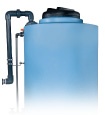Effective wastewater treatment relies on three essential pillars: Physical processes (screening and filtration) Biological treatment (oxidation ponds and lagoons) Chemical applications
Topics:
Applications
Properly treating wastewater is an important, but often misunderstood process. If wastewater isn’t treated correctly, it can be extremely harmful to our environment, including the people and animals that live in it. There are several different elements involved in treating wastewater, including physical treatment that removes particles and debris. However, the chemical treatment of wastewater is especially important.
Topics:
Applications
For over five decades, Poly Processing has been at the forefront of innovation in chemical storage tank design and manufacturing. Reinforcing our commitment to advancing crosslinked polyethylene (XLPE) tank technology, we are thrilled to unveil our latest update to our storage tank solutions: the 15,500-gallon IMFO tank, the 15,000-gallon Sloped Bottom IMFO tank, and the 15,500-gallon Vertical tank, are all available in specific gravities up to 2.2 design. These large innovative XLPE tanks are designed for exceptional durability, reliable performance, and an extended lifespan across a variety of applications. To enhance protection and prolong service life in oxidative environments, such as those involving sodium hypochlorite, they can be manufactured with our industry-leading OR-1000 engineered resin system, known for its remarkable resistance to oxidative chemicals. These tanks represent the best engineering and design in the tank manufacturing industry, and they are covered under PPC’s industry-leading warranty. At Poly Processing, we’re focused on delivering high-quality, forward-thinking solutions to meet the evolving demands of the chemical storage industry.
Topics:
Fittings and Accessories,
Applications
Cone-bottom tanks are generally used in process applications where total drainage of the tank is required. Typical applications would include the storage of heavy materials and materials prone to sludging, which are difficult to drain out of upright tanks. Cone-bottom tanks are also ideal for dry materials, such as grains or cattle feed as they can be 100% drained out of the tank with a flange or slidegate at the bottom of the tank. In addition, materials that require separation can be handled with a decant fitting to remove the liquid from the solids. Let’s take a look at some key considerations for evaluating cone-bottom tank storage solutions — and attractive alternatives.
Topics:
Applications
If you’re storing hazardous materials, secondary containment systems can prevent costly damage to equipment — as well as physical risk to employees — if a primary storage vessel is breached. There are several secondary containment options with varying costs, and concrete containment is a popular industry standard. But you may be surprised when you compare the true costs of a poured-in-place concrete system to Poly Processing’s sophisticated integrated double-wall tank containment system, the SAFE-Tank®.
Topics:
Applications
Sulfuric acid is one of the most widely used chemicals in the United States. More sulfuric acid is produced every year than any other chemical. It has a multitude of industry-specific uses, such as the production of other chemicals, dyes and pigments, water and water treatment, and fertilizers.
Topics:
Applications
Wastewater treatment is an extremely important part of making sure that humans treat the earth with respect. The proper treatment of wastewater is essential not only for the environment — due to the use of several chemicals throughout the process, a safe process also keeps employees and your facility safe.
Topics:
Applications
Winter is approaching fast. With below freezing temperatures and snowstorms affecting millions of people each year, municipalities need to be ready to clear roadways and maintain equipment. De-icing fluid is used to break down ice and frost on roadway surfaces and aircraft. The substance used for de-icing depends on its application, the amount of snowfall, the municipality’s preferences, and winter temperatures. A variety of chemicals are used in the de-icing process, including brine, magnesium chloride, propylene glycol, and ethylene glycol. Brine is the most popular of these chemicals, but it can damage vehicles or rebar on roadways.
Topics:
Applications,
Chemical Storage
Receiving a Poly Processing tank, whether it's for industrial, commercial, or municipal use, is a crucial process that requires careful attention to detail. Before the tank is put into service, several essential steps must be followed to ensure its safety, functionality, and readiness.
Topics:
Applications
Most of the chemical storage tanks that we sell are vertical tanks, IMFO Tanks®, and SAFE-Tanks®. However, we offer several other options to customers. Vertical tanks aren’t the best solution for every circumstance, and sometimes your best option may be a horizontal tank. Let’s look into the three main reasons polyethylene horizontal chemical tanks are a key part of a storage solution and then expand on the use of these tanks in their most popular industry: agriculture.
Topics:
Applications



